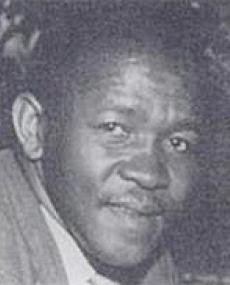
Arthur Elias Letele was born on 2nd October 1915 in Maseru, Lesotho. His father, Elias Letele, was a school inspector. His mother, Catherine, was of Xhosa decent. The Letele family immigrated to South Africa shortly after Arthur's birth and he grew up in Ladybrand in the Free State Province.Letele completed his secondary education at the Lovedale Institution in Alice in the Eastern Cape Province. Following this, he studied at the South African Native College, which later became Fort Hare University, and the University of the Witwatersrand, in Johannesburg. He qualified as a medical doctor in 1946 and began his career the following year in Lovedale.
Letele's involvement in politics began in 1944, when he joined the African National Congress Youth League (ANCYL). In 1948 he decided to move to Kimberley, where he immediately joined the local branch of the African National Congress (ANC),he also establish his practice where there where no african doctors. He was elected as treasurer for the branch. He also married Mary-Anne Nombulelo Grace Nkolombe on 12 July in Cape Town. She was 6 years younger than him and Xhosa by birth. They had four sons and one daughter.In 1952 he persuaded a number of volunteers to defy discriminatory laws during the Defiance Campaign. They were arrested and Letele was sentenced to 10 days' imprisonment or a £3 fine. When he refused to pay the fine he was imprisoned. This was the first of four jail terms that he served.
In October 1952 violence erupted in Kimberley and Letele was again arrested, this time for inciting violence. He was found guilty and was given a 9-month sentence, suspended for two years. He was also prevented from leaving Kimberley until August 1953 as part of his bail conditions.At the end of 1953 Letele was elected to the ANC Executive Committee at the organisation's annual conference. He supported the concept of an American democratic system, but did not harbour any negative convictions towards communism. In 1955 Letele took part in the Congress of the People campaign by collecting the demands of the residents of Kimberley for the Freedom Charter. He also attended the congress in Kliptown near Johannesburg in June 1955 where he proposed the second clause of the charter. This clause stated that all men should be equal before the law.
In 1955 Letele was elected as the treasurer-general of the ANC. In 1956 he stood accused of treason along with 155 liberation movement leaders during the Treason Trial. The charges against him were withdrawn and he was released.After the Sharpeville Massacre of 1960, Letele publicly burned his pass in Orlando near Johannesburg. When he returned to Kimberley, and after the declaration of the State of Emergency, he was arrested. He was detained in various locations including Kimberley and Bloemfontein and was released on 19 July 1960. Although he was released from jail he was not allowed to associate with any organisation or attend any meetings or gatherings without permission from the Kimberley magistrate. The most prominent condition of his release was, however, that he had to leave South Africa within 30 days.
As a result of this condition Letele went into exile in Lesotho in 1961. His family soon joined him. He was allowed to visit Kimberley on occasion and retained his position within the ANC. Although his political involvement was largely focussed on South African matters he did become involved in Lesotho's politics once. On the day before South Africa was to become a republic in 1961, he, and other ANC leaders, attempted to take over the leadership of the Basutoland Congress Party to support the ANC in its resistance to the developments in South Africa.Letele represented the ANC overseas while he had a British passport and in March 1961 he attended the third All-Africa Convention in Cairo, Egypt. Following this, he travelled to Sweden and Britain and also visited Nigeria and Tanzania. In 1963 he visited the Soviet Union as a guest of the Afro-Asiatic Solidarity Committee.Letele committed suicide on 20 December 1965 after suffering from an incurable disease for several years. In 2003 Health Minister Manto Shabalala-Msimang named the South African Institute of Health Care Managers in Letele's honour.